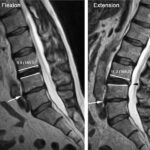MRI LS Spine Extension
Book your MRI LS Spine Extension at Medifyhome, where we offer top-quality scans at the best prices. Our NABL & NABH accredited diagnostic centers ensure accurate and reliable results.
Book an Appointment
MRI LS Spine Extension
Medifyhome has collaborated with the best pathology laboratories that are NABL and NABH certified and follow ISO safety guidelines to provide the best MRI LS Spine Extension at an affordable price for needy individuals. MRI LS Spine Extension is a specific imaging procedure utilized in diagnosing concerns of the extended lumbar spine (lower back). This type of MRI works with the spine and enables the doctors to see things that will not be seen during usual imaging. The lumbar spine assists a major part of body weight and is highly involved in most movement and flexibility. When such a patient presents with chronic back pain, leg pain or other associated symptoms on the lower limb an MRI of the lumbar spine in extension becomes useful in pointing to possible causes of the complaints.
It plays a major role in diagnosis especially in herniated discs, spinal stenosis or spinal instability or any other conditions where one needs help in diagnosis by a doctor. In this way the sections obtained from the MRI containing detailed information of the spine position when it is in extension are extremely helpful and guide the treatment plan of a particular patient to give him or her the best treatment for the spinal condition. To schedule an appointment for MRI LS Spine Extension, simply contact Medifyhome or call our customer care at +919100907036 or +919100907622 for more details and queries.
Why is MRI LS Spine Extension Performed?
An MRI LS Spine Extension is done to rule out and assess conditions that involve the lumbar spine when in an extended position. Here are the primary reasons why an MRI LS Spine Extension may be performed:
1. Identifying Herniated or Bulging Discs
It showed that when the spine is in the extended position it alters the pressure which is exerted on the disc. This can be useful for finding a herniated or bulging disc which may be pinching some of the nerves and causing pain, numbness.
- Assessing Spinal Stenosis
Their spinal stenosis is characterized by a narrowing of the spaces within the spinal cord accompanied by pressure on the nerves within the spinal cord. During the erect posture the spinal canal may become more narrowed and thus this condition can be easily diagnosed in the extended position.
- Diagnosing Degenerative Disc Disease
With time the discs in the spinal column may deform leading to pains and stiffness. The extension position also contributes to determination of disc degeneration since it gives the impression of movement of discs during stress and the level of degeneration.
- Evaluating Spinal Instability
Sometimes an individual may develop a problem with the spinal segments causing modifications in the shifts that a vertebra could make. Magnetic resonance imaging of LS Spine Extension can show that there are some elements of instability in the spine for example excessive motion of the spinal vertebrae and so on and so forth which may necessitate further management or surgical intervention.
- Detection of Facet Joint Arthritis
Flexion and rotation movements in the spine are produced by the facet joints. In some cases, the joint can wear out and appear arthritis that will cause pain and stiffness. MRI LS Spine Extension can reveal better images of the facet joints in dynamic mode to diagnose arthritis and evaluate the disease.
- Evaluating Spondylolisthesis
Spondylolisthesis is a forward displacement of one vertebra relative to the one below it; It is facilitated through instability or degeneration. The MRI in extension can make this symptom manifest as the vertebrae are visualized under conditions of stress.
Conditions Diagnosed with MRI LS Spine Extension
MRI LS Spine Extension is an important diagnostic procedure through which different pathologies influencing the lumbar spine can be established. Below are some of the key conditions that can be diagnosed with an MRI LS Spine Extension:
- Herniated or Bulging Discs
Disc herniation is typically characterized by the ruptured disc, which refers to the way the inner soft tissue of the spinal disc can actually bulge through the outer ring and place pressure on nerves. Slipped disc is another term used in referring to conditions where lower back discs protrude but do not tear.
- Spinal Stenosis
Spinal stenosis is the constriction of the space within the vertebrae through which the spinal nerves pass and may result in leg pain and weakness as well as numbness. In this position, the MRI can reveal if the spinal canal narrows even more, when the spine is elongated.
- Degenerative Disc Disease
In the course of a person’s life, the discs in the spine may become dehydrated and lose elasticity resulting in degenerative disc disease. This condition can be accompanied by pain and stiffness . This position aids in presenting the effects of degeneration on the discs, the height that may have reduced or the shape that they assume that could cause pain.
- Facet Joint Osteoarthritis
The facet joints play the roles of stability in addition to functioning as an aspect of joint morphology that enables movement in the spine. These joints may over time become affected by osteoarthritis which causes pain and stiffness at the lower back. Facet joint arthritis cannot easily be seen on normal MRI scans, but an MRI LS Spine Extension can help show the facet joints in motion and under pressure.
- Spondylolisthesis
Spondylolisthesis is the condition in which one spinal vertebra slides over the other, particularly the one below it as a result of weak muscle or ligaments in the spine. This position in the extension may also make it easier when diagnosing any irregularities of the slippage in the vertebrae.
Benefits of MRI LS Spine Extension
An MRI LS Spine Extension has a number of notable features which make it a very useful tool in the assessment and management of disorders of the lumbar spine. Below are the key benefits of an MRI LS Spine Extension:
1. Non-Invasive Diagnostic Tool
Indeed, the major strength of MRI is that this examination is non invasive. An MRI LS Spine Extension does not involve incisions, injections like many other surgical operations would need. The device utilizes powerful magnets and even radio waves to make pictures of the spine area and is safer for patients than X-rays.
- Dynamic Imaging of the Motion Lumbar Spine
Extension position is also beneficial because it shows more clearly how positions of the spine and its structures – such as the vertebrae, discs, and muscles – change when the spine is arched backwards. This can expose problems such as a slipped disc, trapped nerves, and instability within the spine that may not be apparent with the person standing in the standard erect or even in a bend forward position.
- Assists in Discovering Pathologies Inapparent in Normal MRI
Spinal stenosis, spondylolisthesis, degenerative disc disease and many more spinal conditions are apparently more visible when the spine is in extension. The MRI LS Spine Extension is useful for diagnosing conditions that would otherwise go unnoticed on an MRI or X-ray diagnosis which would cover the entire lower back region.
- Guides Treatment Planning
MRI LS Spine Extension gives doctors more clear information about the movement of the spinal column and, consequently, the severity of the pathological processes in the lumbar region. This realization is significant in strategic treatment management; this can be simple treatment such as physical therapy and medication or enhanced treatments like injections, surgery among others.
- Detects Nerve Compression and Radiculopathy
Compressive neuropathy is often seen in such disorders as herniated discs or spinal stenosis. MRI LS Spine Extension can tell which areas have high pressure on the nerves hence the treatments are alpine in those areas.
- Test Type: MRI LS Spine Extension
- Preparation:
- Wear a loose-fitting cloth
- Fasting not required
- Carry Your ID Proof
- Prescription is mandatory for patients with a doctor’s sign, stamp, with DMC/HMC number; as per PC-PNDT Act
- Reports Time: With in 24 hours
- Test Price: Starts from Rs.4000 to Rs.8000
How to book an appointment for an MRI LS Spine Extension?
To schedule an appointment for MRI LS Spine Extension, simply contact Medifyhome or call our customer care at +919100907036 or +919100907622 for more details and queries.
What is an MRI LS Spine Extension?
MRI LS (Lumbar Spine) extension is a type of specialized MRI technique, taking detailed pictures of the lower back when the spine is extended. The doctors assess the conditions which are not observable in the neutral position of the spine.
Why would I need an MRI LS Spine Extension?
You may need this MRI if you’re experiencing chronic lower back pain, leg pain, numbness, or weakness, especially if other imaging tests have not provided enough information. It is useful for diagnosing conditions such as herniated discs, spinal stenosis, and degenerative disc disease.
Is an MRI LS Spine Extension painful?
No, the MRI itself doesn’t cause pain. You will feel the discomfort from staying in the elongated position, if you happen to have a sensitive or very painful back. It is totally non-invasive and pretty well tolerated.
What is the time duration taken by the MRI LS Spine Extension?
It takes around 30 to 60 minutes, depending on the complexity of images. The patient is usually required to hold still during the procedure so that clear images can be captured.
What are the risks associated with MRI LS Spine Extension?
MRI scans are relatively safe and do not use radiation. However, anyone with metal implants, a pacemaker, or some other conditions may not qualify for an MRI. Always report any implantations of metals or any kind of medical devices to your physician.
Do I need to prepare myself for the MRI LS Spine Extension?
There is not much preparation involved, although you will be required to remove all metal objects including jewelry, glasses, or hearing aids from the body before scanning. You may also be asked to put on a hospital gown. In most cases, you can eat and drink normally before the procedure unless instructed otherwise.
Is an MRI LS Spine Extension available for pregnant women?
In case you are pregnant, ensure that you tell your doctor or the MRI technician. It’s worth noting that MRI is pretty safe in pregnancy, except there are some precautions taken more seriously, especially during the first trimester. Your doctor will evaluate whether an MRI is needed.
When will I receive my MRI results?
A radiologist will examine the images from your MRI and forward a report to your physician, usually within 24 to 48 hours. The results will then be shared with you by your physician who can recommend any subsequent courses of action or treatment needed.
Why Choose Medifyhome for an MRI LS Spine Extension?
Medifyhome is an online medical consultant, which offers home services not only in your city but also in all major cities of India, such as Hyderabad, Chennai, Mumbai, Kolkata and others. This makes it easy for us to work with diagnostic centers that boast of having the most accurate equipment. The customer service for booking the appointment of the services is available 24/7 and Medifyhome also comes with instructions. Medifyhome has not only the best diagnostic centres, but it offers them at very cheaper prices. If you have been tested, you can promptly schedule an appointment with a health care service through our list of skilled physicians. For appointments for MRI LS Spine Extension, you can chat with us through Medifyhome or call our customer care at 919100907036 or 919100907622 for more information or inquiries.





